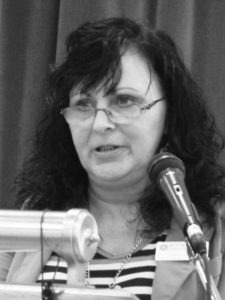
By Michael Howell
It’s not easy to remove oneself from an abusive relationship. Just ask Meri Telin, who suffered years of abuse before she was finally able to walk away from it and begin her life anew.
“I probably left my husband a hundred times and a hundred times I went back,” Telin told those gathered at Hamilton City Hall last week to hear Supporters of Abuse Free Environments’ (S.A.F.E.) annual report to the community. Telin is the recipient of this year’s Courage Award.
Telin said that things changed for her one day when she heard the story of another woman and how she suffered before finally finding the courage to make a change.
“She told me, ‘if I can do it, so can you’,” said Telin. “‘Get out of your chair, Meri, no one can change your life but you’.” The paradox is that, without those words of encouragement, without the help of others, who sympathize and understand, with no place to go, it is hard for a victim of abuse to muster the courage to end that relationship.
It’s out of thankfulness for the help she received that Telin is now one of those who, standing on her own, has the courage to speak up about the horrors of domestic violence in the hope that it might help others.
One difficult part of emerging from an abusive relationship is recovering a sense of self-worth and Telin thanked Dixie Stark at Literacy Bitterroot for her help in that regard.
“She said to me, ‘Meri, you are smart. You could go to college’ and two months later I was attending Bitterroot College. Four months later, I was divorced,” said Telin.
“Thank you, Dixie, for seeing something in me that I couldn’t see myself,” said Telin.
“Every ending is a new beginning,” said Telin. “I am no longer a statistic. I’m an example of someone who could change her life. And if I can do it, you can do it.”
Marla Brown, who runs the S.A.F.E. Thrift Store, received the Community Service Award.
“She is the go-to person who can solve any problem,” said S.A.F.E. director Stacey Umhey. She praised Marla’s “absolute skill at assessing someone’s needs and connecting them with the people who can help.”
S.A.F.E. staff can help victims of abuse rebuild their lives in a number of ways. S.A.F.E. offers emergency shelter and transitional housing for victims where the average stay is up to 27 days. In the past year, S.A.F.E. has housed 62 adults and 42 children and their pets for a total of 3,295 nights. S.A.F.E. answered 397 crisis calls and provided 599 in-person crisis counseling sessions.
S.A.F.E. staff can also help survivors obtain drivers licenses, jobs, education, affordable housing and reliable transportation.
Community Programs Manager Jamie Ogden spoke about how economic injustice affects victims of sexual and domestic violence. She said the Bitterroot community was coming together to address the issues of poverty and homelessness that can lead to a type of economic bondage that can keep a person trapped in an abusive relationship.
University of Montana professor Celia Winkler gave a detailed statistical report outlining the severity of gender wage inequality that contributes to the problem. She said that sixty-eight percent of single women with children have incomes below the poverty level. She said that low wages were just a part of the picture. There is also the cost and availability of child care for a single mom and other cultural impediments, including outright discrimination, that can make it difficult for a single mother to earn a decent wage.
In response to an ever growing need for emergency shelter and affordable housing in the Bitterroot, a group of approximately 30 local service providers gathered last March to discuss the community’s current assets and gaps with regard to affordable housing and homelessness. Called the Bitterroot Housing and Homelessness Initiative, their goal is to develop a core group of individuals that are able to work on the housing issues. Their second meeting is scheduled for Tuesday, October 25, from 9:30 a.m. to 12 noon at the Blodgett/Canyon View Conference Room at Marcus Daly Memorial Hospital.